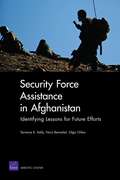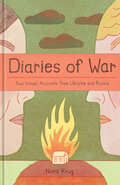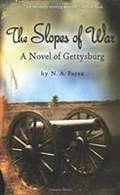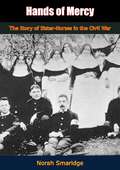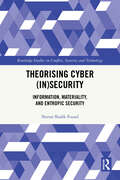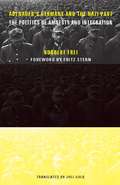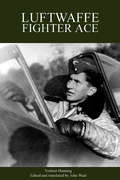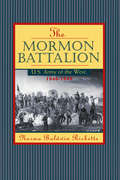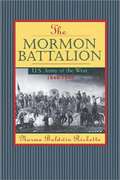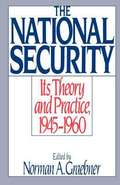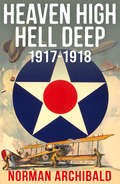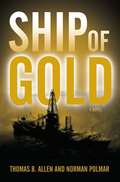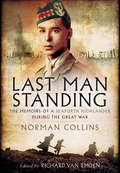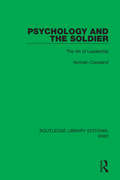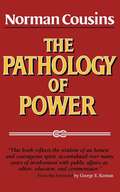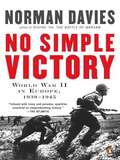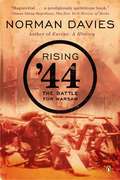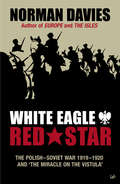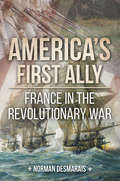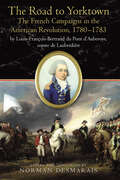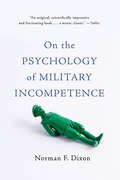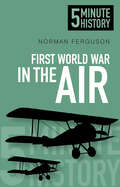- Table View
- List View
Security Force Assistance in Afghanistan: Identifying Lessons for Future Efforts
by Nora Bensahel Olga Oliker Terrence K. KellySecurity force assistance (SFA) is a central pillar of the counterinsurgency campaign being waged by U.S. and coalition forces in Afghanistan. This monograph analyzes SFA efforts in Afghanistan over time, documents U.S. and international approaches to building the Afghan force from 2001 to 2009, and provides observations and recommendations that emerged from extensive fieldwork in Afghanistan in 2009 and their implications for the U.S. Army.
El Cid: The Life and Afterlife of a Medieval Mercenary
by Nora Berend'A fascinating study of historical mythmaking... Concise and absorbing'Paul Freedman, author of Out of the EastRodrigo Díaz lived a violently colourful life in eleventh-century Spain. An ambitious military leader, exile and brutal mercenary, he served Christian kings, fought against Christian princes in service of Muslim rulers, raided and killed Muslims and eventually struck out on his own, carving out an independent principality. While Rodrigo the man is long dead, El Cid lives on: a superhero; a quasi-saint; the 'spirit of Spain', according to military dictator Franco; and a champion of medieval Spanish multiculturalism. Nora Berend uncovers how el Cid has been transformed across the centuries, confronting the gulf between truth and legend and examining how a military adventurer became a hero to people on opposite ends of the political spectrum. What is it about this man that appeals to us? And why do we transform the most unsuitable people into heroes?'Would the real El Cid please stand up? Nora Berend's fascinating new book covers nearly a thousand years of history and myth-making about this eleventh-century warrior . . . and presents all the delicious ironies of history'Professor Marc David Baer, author of The Ottomans: Khans, Caliphs, and Caesars
El Cid: The Life and Afterlife of a Medieval Mercenary
by Nora Berend'A fascinating study of historical mythmaking... Concise and absorbing'Paul Freedman, author of Out of the EastRodrigo Díaz lived a violently colourful life in eleventh-century Spain. An ambitious military leader, exile and brutal mercenary, he served Christian kings, fought against Christian princes in service of Muslim rulers, raided and killed Muslims and eventually struck out on his own, carving out an independent principality. While Rodrigo the man is long dead, El Cid lives on: a superhero; a quasi-saint; the 'spirit of Spain', according to military dictator Franco; and a champion of medieval Spanish multiculturalism. Nora Berend uncovers how el Cid has been transformed across the centuries, confronting the gulf between truth and legend and examining how a military adventurer became a hero to people on opposite ends of the political spectrum. What is it about this man that appeals to us? And why do we transform the most unsuitable people into heroes?'Would the real El Cid please stand up? Nora Berend's fascinating new book covers nearly a thousand years of history and myth-making about this eleventh-century warrior . . . and presents all the delicious ironies of history'Professor Marc David Baer, author of The Ottomans: Khans, Caliphs, and Caesars
Diaries of War: Two Visual Accounts from Ukraine and Russia [A Graphic Novel History]
by Nora KrugPowerful graphic journalism that highlights the contrasting realities of a Ukrainian journalist and a Russian artist grappling with their own individual experiences of Russia&’s war on Ukraine—collected, edited, and illustrated by award-winning author Nora KrugImmediately after Russia began its unprovoked invasion of Ukraine in February 2022, Nora Krug reached out to two anonymous subjects—&“K.,&” a Ukrainian journalist, and &“D.,&” a Russian artist—and began what would become a year of correspondence. Based on her weekly interviews with K. and D., Krug created this collection of illustrated accounts that chronicles two contrasting viewpoints from opposing sides of the first year in this ongoing war.With millions displaced, injured, or killed as a result of the invasion, Krug presents a look at the devastating effects on an everyday, individual level. K.&’s diary documents a year of emotional and existential distress. She experiences loss in every sense of the word: the death of those close to her, the disconnection from her family and friends, and the devastation of her country—but her account is also a story about bravery and survival in the face of dire uncertainty.In juxtaposition, D.&’s narrative details his disdain for his government&’s murderous actions and his attempts at emigrating his family abroad. He navigates his own struggle with cultural identity, guilt, and lack of action in the face of a tyrannical regime—a perspective that is necessary in challenging readers to confront the political actions of their own countries. Krug approaches Diaries of War with the immense skill and thoughtfulness required to document these two complicated experiences for the purpose of encouraging critical thinking.Published as an Op-Comic series with the Los Angeles Times, with a portion of the entries unique to this book, Diaries of War is a harrowing real-time record of an international conflict that continues to devastate countless lives.
Fox Girl
by Nora Okja KellerNora Okja Keller, the acclaimed author of Comfort Woman, tells the shocking story of a group of young people abandoned after the Korean War. At the center of the tale are two teenage girls—Hyun Jin and Sookie, a teenage prostitute kept by an American soldier—who form a makeshift family with Lobetto, a lost boy who scrapes together a living running errands and pimping for neighborhood girls. Both horrifying and moving, Fox Girl at once reveals another layer of war's human detritus and the fierce love between a mother and daughter. .
The Slopes Of War
by Norah PerezBuck Summerhill is a young soldier from West Virginia. He faces the horrors of the battle of Gettysburg knowing that his two cousins, Custis and Mason, may be fighting against him in the Army of Northern Virginia. The Slopes of War is a fast-paced, panoramic story of a family divided in loyalty but equally affected by the dangers and sometimes senseless brutality of battle.
Hands of Mercy: The Story of Sister-Nurses in the Civil War
by Norah SmaridgeSix hundred nuns from twelve religious communities served as U.S. Army nurses during the Civil War. They served on the battlefield and gave their lives. A group of Sisters of Mercy traveling to St. Louis on a Union steamboat took fire from a Confederate gun battery and worked through it, tending the wounded. At Gettysburg one St. Joseph sister wiped the blood-covered face of a young soldier to discover that he was her 18 year-old brother.When the Sisters of Providence took over the military hospital in Indianapolis during the Civil War, they found that “it was dirty beyond belief. A scouring brigade was formed, and the nuns went down on their knees, scrubbing every inch of the stained and dirty floors. They washed walls and windows, threw out dirty mattresses, and soon had the wards clean and sweet-smelling. Next they set up kitchens, special diet kitchens, and a laundry.”Soldiers, doctors, military officials, civilians—all learned to respect and admire the Sisters, who came to be known as the Sisters of Charity.In the years following the Civil War, nuns established 800 hospitals, the basis for a network of Catholic hospitals that now serves one in six patients, the largest private group in the U.S.This wonderful book by Norah Smaridge provides a glorious in-depth portrait of the many Sister-Nurses during the Civil War years.
Theorising Cyber: Information, Materiality, and Entropic Security (Routledge Studies in Conflict, Security and Technology)
by Noran Shafik FouadThis book argues that cybersecurity’s informational ontology offers empirical challenges, and introduces a new interdisciplinary theoretical and conceptual framework of ‘entropic security’.Cyber-attacks have been growing exponentially in number and sophistication; ranging from those conducted by non-state actors to state-backed cyber-attacks. Accordingly, cybersecurity now constitutes an integral part of public, private, and academic discourses on contemporary (in)security. Yet, because its emergence as a novel security field occurred after many long-established frameworks had already been developed, cybersecurity has been repeatedly scrutinised for its compatibility with conventional security theories, concepts, and understandings, particularly with that of military security. This book, however, argues that cybersecurity differs profoundly from many other security sectors because of the ontological nature of ‘information’ that sits at the heart of this field. Through this new framework, the book investigates three key empirical challenges in cybersecurity that are co-produced by its informational ontology: (1) the disordered nature of cybersecurity and its tendency towards increasing insecurity as a manifestation of the intrinsic uncertainties in information systems; (2) the unpredictable and unintended consequences resulting from autonomous cyber-attacks that challenge human control of cybersecurity environments; and (3) the persistent harms engendered by ‘mundane’ cyber threats that do not fit within conventional understandings of existentiality in security theories. Through a detailed analysis of cybersecurity discourses and practices in the USA (2003-present), the book goes on to show how these complex cybersecurity challenges are better analysed and theorised through the new information-theoretic notion of ‘entropic security’.This book will be of much interest to students of cyber-security, critical security studies, science and technology studies and International Relations in general.
Adenauer's Germany and the Nazi Past: The Politics of Amnesty and Integration
by Norbert FreiOf all the aspects of recovery in postwar Germany perhaps none was as critical or as complicated as the matter of dealing with Nazi criminals, and, more broadly, with the Nazi past. While on the international stage German officials spoke with contrition of their nation's burden of guilt, at home questions of responsibility and retribution were not so clear. In this masterful examination of Germany under Adenauer, Norbert Frei shows that, beginning in 1949, the West German government dramatically reversed the denazification policies of the immediate postwar period and initiated a new "Vergangenheitspolitik," or "policy for the past," which has had enormous consequences reaching into the present. Adenauer's Germany and the Nazi Past chronicles how amnesty laws for Nazi officials were passed unanimously and civil servants who had been dismissed in 1945 were reinstated liberally—and how a massive popular outcry led to the release of war criminals who had been condemned by the Allies. These measures and movements represented more than just the rehabilitation of particular individuals. Frei argues that the amnesty process delegitimized the previous political expurgation administered by the Allies and, on a deeper level, served to satisfy the collective psychic needs of a society longing for a clean break with the unparalleled political and moral catastrophe it had undergone in the 1940s. Thus the era of Adenauer devolved into a scandal-ridden period of reintegration at any cost. Frei's work brilliantly and chillingly explores how the collective will of the German people, expressed through mass allegiance to new consensus-oriented democratic parties, cast off responsibility for the horrors of the war and Holocaust, effectively silencing engagement with the enormities of the Nazi past.
Luftwaffe Fighter Ace: From The Eastern Front To The Defense Of The Homeland (Stackpole Military History Ser.)
by Norbert HannigA World War II memoir by the renowned German fighter pilot—from his Hitler Youth glider training to combat missions against the Soviet Air Force. Herr Norbert Hanning&’s wartime career makes for fascinating and highly informative reading on an aspect of the 1939-45 air war not often covered in the English language; primarily that of the campaign against the Soviet Union. He was one of the midwar-generation Luftwaffe fighter pilots and began operations with JG 54 on the eastern (Leningrad) front in early 1943; initially flying Messerschmitt Bf 109s before transitioning to the Focke-Wulf Fw 190. He became a Staffel CO and was credited with 42 victories, also serving with JV 44 (whose CO was Adolf Galland); he then returned to Germany towards the closing stages of the war to convert to Me 262 jet fighters. Many and varied were his experiences in action against the rejuvenated Soviet Air Force in the east, and the powerful western Allies over the homeland during the final chaotic months of hostilities, which culminated in his captivity. John Weal&’s skillful translation ensures that the fluid and descriptive style of the author is preserved. Thankfully, also, Norbert was a keen photographer who shot a profusion of images, all previously unpublished, many of which appear in this important book.
Mormon Battalion: United States Army of the West, 1846-1848
by Norma RickettsFew events in the history of the American Far West from 1846 to 1849 did not involve the Mormon Battalion. The Battalion participated in the United States conquest of California and in the discovery of gold, opened four major wagon trails, and carried the news of gold east to an eager American public. Yet, the battalion is little known beyond Mormon history. This first complete history of the wide-ranging army unit restores it to its central place in Western history, and provides descendants a complete roster of the Battalion's members.
The Mormon Battalion
by Norma RickettsFew events in the history of the American Far West from 1846 to 1849 did not involve the Mormon Battalion. The Battalion participated in the United States conquest of California and in the discovery of gold, opened four major wagon trails, and carried the news of gold east to an eager American public. Yet, the battalion is little known beyond Mormon history. This first complete history of the wide-ranging army unit restores it to its central place in Western history, and provides descendants a complete roster of the Battalion's members.
The National Security: Its Theory and Practice, 1945-1960
by Norman A. GraebnerBased on a conference at West Point, this volume explores the national security policies developed by the Truman and Eisenhower administrations in response to the threat of Soviet expansionism. More pointed and analytic than any other book on the subject, it shows clearly that the makers of Cold War policy were motivated by fear. It also examines the nature of U. S. security policy and points to the growing gap between the ends and the means of global security policy--the goal of protecting Western democracy from the "Red Menace" by using a nuclear strategy with limited applications. The contributors, including David Alan Rosenberg, Lloyd C. Gardner, Martin J. Sherwin, and Gary W. Reichard explore such issues as how dependence on nuclear weapons became the central doctrine of American foreign policy, the bureaucratic and political context of U. S. security, Eisenhower's ongoing disputes with Army and Navy leaders over the security issue, the objections of Democrats to the evolving security strategy, and the limits of Cold War policy, particularly how the viewing of the Third World through a U. S. -Soviet prism impeded us from developing a truly global security policy. Written in an accessible, journalistic style, The National Security makes available a wealth of information on the Cold War period and offers insights into fears that dominate political thinking to this day.
Heaven High Hell Deep 1917 -1918
by Norman ArchibaldHeaven High, Hell Deep, 1917-1918, first published in 1935, is author Norman Archibald's account of his experiences as an aviator in World War One. Archibald (1894-1975) joined the fledgling U.S. Army Air Service in the spring of 1917, underwent flight training in the U.S. and France, and began his hazardous patrol and combat duty in the skies against the Germans. Unfortunately, after several months at the front, Archibald's plane was hit by shrapnel and he was forced to crash-land behind enemy lines. His story continues with his imprisonment and deprivations as a prisoner-of-war until the war's end and his journey to freedom in Switzerland and France.
Ship of Gold
by Thomas B. Allen Norman C. PolmarShip of Gold is an exciting, fast-paced tale of action, intrigue, and adventure on the high seas-told with the ringing authenticity only firsthand knowledge can impart.In 1945, the U.S. submarine Tigerfish mistakenly torpedoed and sunk a Japanese cargo ship. The ship, allegedly carrying supplies to allied POWs, had been given safe passage. But, in fact, the Osaka Maru was a Japanese Trojan horse: a cunning ruse devised by a powerful secret society to transport tons of gold out of Japan under the very eyes of the enemy. Some thirty years later, the commander of the Tigerfish is murdered in Washington. As the CIA launches its investigation into his death, a race to raise the ship and recover its treasure begins, which mounts to an international incident involving the U.S., China, the Soviet Union and Japan.The action of this taut thriller provides the behind-the-scenes reality of the national security system at work-the CIA, the Oval Office, the Pentagon, and the National Security Council-all scrambling to solve the crisis and to have control of the operation. It is a stunning portrait that all too closely resembles real life. This gripping, authentic thriller, which culminates in the most exciting naval chase since The Hunt for Red October, is must-reading for fans of Tom Clancy, Clive Cussler, and Alistair MacLean.
Last Man Standing: The Memiors of a Seaforth Highlander During the Great War
by Norman CollinsA first-hand account of World War I by a nineteen-year-old Englishman who led a platoon into the carnage of the Battle of the Somme. While researching his excellent earlier book: Veterans of World War I, author Richard Van Emden encountered a fascinating personality of that long-ago conflict. After witnessing German naval attacks on British civilians, Norman Collins enlisted in the Seaforth Highlanders of the 51st Highland Division, even though he was under age. Collins fought at the battles of Beaumont Hamel, Arras, and Passchendaele, and was wounded several times. Collins lived to be 100 and had an unusually detailed collection of letters, documents, illustrations and photographs. Richard Van Emden has written a moving biography of a unique personality at war, and his long life after the dramatic events of his youth.&“This is a harrowing tale of battle, loss and the horrors of war.&” —Scotland Magazine&“His collection of letters, photographs and the record of interviews as an old man are a treasure trove of information on Western Front fighting.&” —British Army Review/Soldier Magazine&“Enthralling memoir. These letters form the freshest part of this book, full of detail about kit and food that obsessed soldiers but which do not find a place in the history books.&” —Who Do You Think You Are?&“This is one of the last great first-person memoirs of the Great War. Extraordinary diary, letter collection and photos.&” —Scottish Legion News
Psychology and the Soldier: The Art of Leadership (Routledge Library Editions: WW2 #25)
by Norman CopelandThis book, first published in 1944, stresses the point that there is no shortcut to successful wartime leadership, and pays a close analysis to the attributes that contribute to being a sound leader of soldiers. Written in the middle of the Second World War, this book gives us valuable insights into the values and training of the British Army in the second half of the war.
The Pathology Of Power
by Norman CousinsIn this book, a seasoned commentator on world affairs discusses the way power in government becomes enlarged, exploited, and institutionalized—not just as the result of external dangers, real or contrived, but as the result of the way the arms race spills over into and dominates foreign policy. The clandestine operation that led to the Iran-Contra affair, Norman Cousins observes, is a recent example of dangerous trend with its own momentum. Mr. Cousins returns here to the central theme that dominated the editorial pages of the Saturday Review during the thirty years of his editorship: the challenge to human freedom and safety represented by vast destructive power slipping away from the means of control.
No Simple Victory
by Norman DaviesWhat was the biggest operation of World War II in Europe? It wasnt D-Day. What was the name of the largest concentration camp operating in Europe between 1939 and 1945. It wasnt Auschwitz. What European nationality lost the largest number of civilians between 1939 and 1945? It wasnt the Frenchor the Germans. Bringing his usual fresh eye to bear on a story we all think we know, Norman Davies answers these questions, and many more, in this concise, vivid, and thought-provoking new history of the Second World War. Powerfully argued, compellingly written and devastating in its conclusions, Davies forces us to look again at those six years and to discard the usual narrative of Allied good versus Nazi evil. He reminds us that for the greater part of the continent, the Allied victory and the liberation of Europe was the beginning of more than 50 years of totalitarian oppression.
Rising '44: The Battle for Warsaw
by Norman DaviesOne of the most dramatic and shameful episodes in World War II was the doomed Warsaw uprising of 1944--an uprising that failed because the Allies betrayed it. This book retrieves its subject from the shadows of history, revealing its pivotal importance to the outcome of World War II and the Cold War that followed.
White Eagle, Red Star: The Polish-Soviet War 1919-20
by Norman DaviesSurprisingly little known, the Polish-Soviet War of 1919-20 was to change the course of twentieth-century history. In White Eagle, Red Star, Norman Davies gives a full account of the War, with its dramatic climax in August 1920 when the Red Army - sure of victory and pledged to carry the Revolution across Europe to 'water our horses on the Rhine' - was crushed by a devastating Polish attack. Since known as the 'miracle on the Vistula', it remains one of the most decisive battles of the Western world. Drawing on both Polish and Russian sources, Norman Davies illustrates the narrative with documentary material which hitherto has not been readily available and shows how the War was far more an 'episode' in East European affairs, but largely determined the course of European history for the next twenty years or more.
America's First Ally: France in the Revolutionary War (The Pocket Manual Series)
by Norman Desmarais<p>The Revolutionary War historian provides “a comprehensive and accessible guide” to the vital influence France had on America’s path to independence (Publishers Weekly).<p> <p>French support for United States independence was both vital and varied, ranging from ideological inspiration to financial and military support. In this study, historian Norman Desmarais offers an in-depth analysis of this crucial relationship, exploring whether America could have won its independence without its first ally.<p> <p>Demarais begins with the contributions of French Enlightenment thinkers who provided the intellectual frameworks for the American and French revolutions. He then covers the many forms of aid provided by France during the Revolutionary War, including the contributions of individual French officers and troops, as well as covert aid provided before the war began. France also provided naval assistance, particularly to the American privateers who harassed British shipping. Detailed accounts drawn from ships’ logs, court and auction records, newspapers, letters, diaries, journals, and pension applications.<p> <p>In a more sweeping analysis, Desmarais explores the international nature of a war which some consider the first world war. When France and Spain entered the conflict, they fought the Crown forces in their respective areas of economic interest. In addition to the engagements in the Atlantic Ocean, along the American and European coasts and in the West Indies, there are accounts of action in India and the East Indies, South America and Africa.<p>
The Road to Yorktown: The French Campaigns in the American Revolution, 1780–1783
by Norman DesmaraisThe fate of the American Revolution had yet to be decided when a remarkable 21-year-old Frenchman arrived in America. Louis-François-Bertrand, the Count of Lauberdière, belonged to an old noble family that traced its heritage back to the Crusades. His father, François-Charles-Mathieu, was musketeer of the guard of King Louis XV. More important, his uncle was General Rochambeau, the commander of all French forces in America. The Count of Lauberdière kept one of the most remarkable diaries of the entire war, and it is published here for the first time as The Road to Yorktown: The French Campaigns in the American Revolution, 1780-1783, by Louis-François-Bertrand du Pont d’Aubevoye, comte de Lauberdière, translated and edited by Norman Desmarais. Serving as aide-de-camp on General Rochambeau’s staff, the young and well-educated Lauberdière enjoyed a unique perspective of the war. He rubbed shoulders with some of the Revolution’s most important personalities (including George Washington and Lafayette), and was in the epicenter of many of the war’s momentous events. His journal covers a host of topics in remarkable detail, including descriptions of the French army’s camp in Newport, Rhode Island, the long march to Yorktown, the siege, and capture, and a fascinating examination of the people and their distinctive colonial culture. His keen eye and sharp descriptions of the Army’s daily activities and movements provide a wealth of information for inquisitive readers and historians—details found only in this diary. For example, nearly all French diaries mention the army’s arrival and landing at Newport, but only Lauberdière’s identifies exactly where it occurred. Anti-French prejudices were common, and the nephew recorded how Rochambeau dispelled them and won over the locals. Culture fascinated the young Count, who keenly observed how the colonials attempted to imitate European manners and styles, marveling at how Philadelphia adopted Parisian fashions in the brief time between his visits there. He even visited Washington’s home at Mount Vernon and made pointed comments about his wife, Martha. With its expertly crafted footnotes, maps, and illustrations, The Road to Yorktown offers a fresh and invigorating firsthand account that will satisfy even the most demanding student of the American Revolution.
On the Psychology of Military Incompetence
by Norman F. DixonThe Crimea, the Boer War, the Somme, Tobruk, Pearl Harbor, the Bay of Pigs: these are just some of the milestones in a century and a half of military incompetence, of costly mishaps and tragic blunders. Are these simple accidents-as the "bloody fool” theory has it-or are they inevitable?The psychologist Norman Dixon argues that there is a pattern to inept generalship, a pattern he locates within the very act of creating armies in the first place, which in his view produces a levelling down of human capability that encourages the mediocre and limits the gifted. A classic study of military leadership, On the Psychology of Military Incompetence is both an original exploration of infamous modern battles and an essential guide for the next generation of military leaders.
First World War in the Air: 5 Minute History
by Norman FergusonHow much can you really find out about the War in the Air during the First World War in five minutes? This handy little history book will surpass all your expectations and leave you well versed on all you wish to know, and maybe even a little bit more… Who was the highest-scoring ace? Which plane looked like a dog begging? What was the Black Flight? How many died in the first Blitz? What was the Fokker Scourge? Jam-packed with facts, stats and first-hand accounts of the action, all woven together in an accessible way by an expert in the field, this 5 Minute History is a valuable addition to anyone’s bookshelf, ready to be delved into at a moment’s notice.
